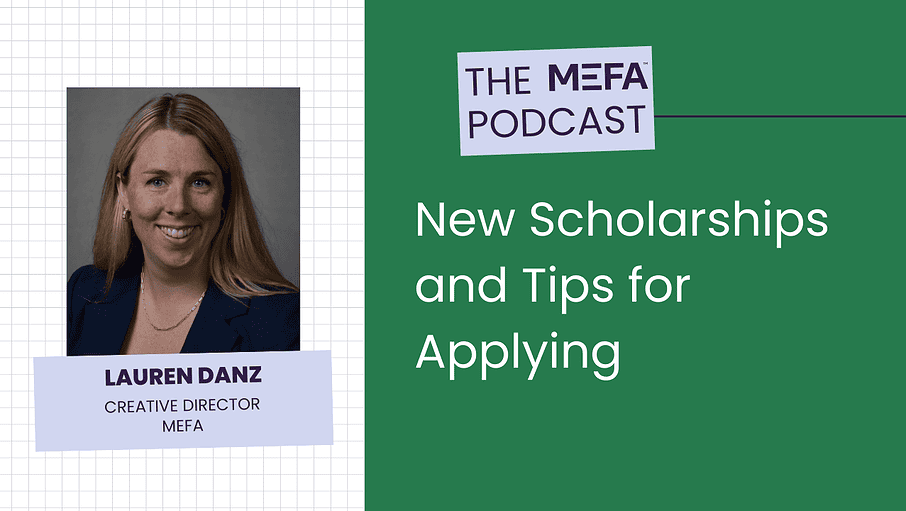

Resources Mentioned in this Episode
Jonathan Hughes: [00:00:00] Hello everyone and welcome to The MEFA Podcast. My name is Jonathan Hughes.
Julie Shields-Rutyna: And I’m Julie Shields-Rutyna.
Jonathan Hughes: Hi Julie, how’s it going?
Julie Shields-Rutyna: Oh, it’s great.
Jonathan Hughes: Good to have you back on the show. It feels like it’s been a long time, but I don’t know. It might not have been. Does it feel like a long time to you?
Julie Shields-Rutyna: A little bit. I think it’s been a couple of weeks.
Jonathan Hughes: Yeah, it’s been a couple of weeks longer than I like, longer than I like. Me too. Good, good. I’m glad we’re all here today. Not only is Julie back with us here today, but we have Lauren Danz back on the show to talk about scholarships. Today’s show is all about scholarships.
In fact, we did a webinar recently outlining tips on applying for scholarships, so we’ll go over some of those tips. And Lauren will also provide some information on scholarships. that are coming up, that have upcoming deadlines, most of them in April. But first, Julie, [00:01:00] how do you feel about answering a mailbag question?
Julie Shields-Rutyna: I would love to answer a mailbag question.
Jonathan Hughes: I want to point out that the mailbag questions are questions that have come into us over the past few weeks and answered by our college planning team. So remember, if you’re listening, if you have any questions, you can email us at [email protected]. You can call us at 800-449-MEFA, and you can also reach us over social media on Facebook, that’s @MEFAMa. On X, that’s @MEFATweets and on Instagram that’s @MEFA_MA. So today our questions come to us from Shane. Who has a few questions about 529 plans. I like these questions because first of all, it gives us a break from the FAFSA. I know we’re talking about FAFSA a lot lately, and it’s important that we talk about FAFSA, but also we’re getting, this is the time of year for some reason where we start to get a lot of college savings questions.
So I feel like this is on people’s minds at this time of year. So he asks [00:02:00] us, do both plan types, and by that he means the U Fund and the U Plan. Allow transfer to other state plans if the owner moves out of state. So there’s a few questions in there, Julie, before we move on to the other one. So why don’t we go ahead and I’ll have you address
Julie Shields-Rutyna: So the UFund is a 529 plan and the UPlan is not, and that’s the key. It’s a prepaid tuition plan. So with the UFund 529 college investing plan here in Massachusetts, yes, you can transfer 529 plan funds to any other 529 plan in the whole country and vice versa. So if people move and they decide they want to, first of all, if you move, you don’t have to transfer your plan.
You can just keep it in the other state. But if you want to transfer it, you can transfer between 529 plans at any time without penalty. So the UFund allows [00:03:00] all of that, all 529 plans. You can move to the other one, any other one at any point. But the UPlan is different. The UPlan is a unique program, a unique prepaid tuition program.
And we can get into at another time, all of the wonderful things about that. I’d say, check that out on our website, but since that is not a 529 plan per se, then that is not that it cannot be rolled into another 529 plan.
Jonathan Hughes: Yeah, and I think you did say this, but just to be sure, if you move out of state and you have a U plan, you can still hold on to it. You don’t have to do it. You don’t have to…
Julie Shields-Rutyna: Absolutely.
Jonathan Hughes: So next question is, For the plans that do allow market investment, what are the investment options? Does the owner have full control or is there just a limited selection of funds? Yeah. What do you think, Julie?
Julie Shields-Rutyna: Yeah, so that’s a great question. One of the ways most 529 plans are [00:04:00] structured is that they do have a selection of funds portfolios and you have choice over how you in what portfolios you put your money. However you can’t just go in and pick individual stocks and have unlimited choice to how you do that. Each 529 plan has their own list of portfolios and you select and they’re usually a nice range from portfolios that are invested more highly in the stock market to those that are very conservative and you have a choice, but other than that, you can’t.
Go in and pick individual stocks or decide. So one of the things you can do though, is research different 529 plans and look at their selection of options for you.
Jonathan Hughes: And just, the U fund, which is the Massachusetts 529 plan through MIFA has selected Fidelity, right? I wonder if you could talk a little bit about what Fidelity can [00:05:00] offer.
Julie Shields-Rutyna: Oh, yes. Fidelity is the UFund Program Manager, and so Fidelity has selected the portfolios that fall within the 529 plan. And again, because they are fund managers, that’s their expertise, they have selected a options that they feel will work for a large number of families.
Jonathan Hughes: Yeah, maybe we’ll have somebody from Fidelity on to talk about the investment end of things shortly. Stay tuned Let’s see if we can manage that. All right, Julie. Thank you so much So one more time if you have any questions, you can email us at [email protected] You can call us at 800 449 MEFA. Our Facebook once again is @MEFAMa, Our X is at @MEFATweets and our Instagram is @MEFA_MA. Just remember this, we have a bunch of college guidance experts waiting to answer your question.
Now, without further ado, let’s welcome back to the show, Lauren Danz. Lauren’s instrumental, among other things, in getting [00:06:00] this show on the air, so thank you for that. But one of her other roles is that she periodically updates a list of scholarship opportunities on the MEFA website and through our social channels that she’s going to do that for us today.
So Lauren, welcome back to the show.
Lauren Danz: Hi.
Julie Shields-Rutyna: Hi Lauren.
Jonathan Hughes: Hello. So nice to have you back.
Lauren Danz: Yes, thank you for having me back.
Julie Shields-Rutyna: And as Jonathan said, we’re going to review some tips on applying for scholarships. So let’s start off with our first tip. Start early. What do we have to say about that?
Lauren Danz: Yes. So as we’ve mentioned before on the show, but it bears repeating, a lot of families start looking for scholarships in the year or two before their kids are sent, set to enter college, but you can do it a lot earlier.
So as we say in the webinar, there are scholarships for kids as young as five. To that end, we don’t have any today for children quite that young, but of the scholarships we are going to highlight today, there are many that we have just posted about on our [00:07:00] Scholarships with April Deadlines blog post.
And we can link to that in the show notes. So we just posted a Scholarships for Student Artists blog as well. And that one has a scholarship called the Ocean Awareness Scholarship. That one is open for students ages 11 to 18. The deadline for that one is June 10th. And there are multiple prizes of up to 1,000.
Julie Shields-Rutyna: Ooh, what do students have to do to apply for that?
Lauren Danz: Yeah, so I’ll read the description for it. Think about climate issues and solutions and consider how they have affected you or your community. Find something that resonates deeply with your experiences and share your personal climate story. Submissions are accepted as visual art, creative writing, film, interactive and multimedia, performing arts, poetry, and spoken word.
So a lot of options. And you can apply for that one at bowseat.org/programs/oceanawarenesscontest. And we can link to that in the show [00:08:00] notes too.
Jonathan Hughes: Yeah, that question that you asked, Julie, put me in mind of another tip from the webinar, which is stay organized, right? That’s another tip that we have, stay organized.
Can you talk about that?
Lauren Danz: Yeah, so one of the things that Shawn talked about in that webinar is staying organized and starting a spreadsheet of scholarships. So students can and should identify the important elements of each scholarship. So the amount, the deadline, the age eligibility, the application process. So does it, require an essay or artwork? And that way they can prioritize the scholarships because one of the other things that we recommend is to cast a wide net when you apply for scholarships.
Jonathan Hughes: Now, what do you mean by that?
Lauren Danz: Apply for a lot of scholarships. Apply for as many as you can, or at least as many that you feel you have a shot at getting, even if it’s an outside shot. If you have a list of scholarships, you can prioritize, if you have a list of scholarships, you can prioritize [00:09:00] them by amount, or deadline, or likelihood of receiving.
Julie Shields-Rutyna: And a good reason to do this is what Sean said in the webinar about There’s a lot of unawarded scholarship money out there.
Lauren Danz: Yes, that was really surprising. There is over a hundred million dollars a year in unclaimed scholarships.
Jonathan Hughes: Alright, let’s highlight another scholarship tip which is to pick scholarships that require essays. Now, why would you do that?
Lauren Danz: Because students may shy away from applying for those. Students have had to write essays for admission to college, and a lot of students find that really nerve wracking.
And writing an essay is work. Fewer students are applying for the same scholarships, which of course increases your chances of getting it. Now, a good tactic is to use the same essay, slightly modified, for multiple scholarship applications. And the more niche the scholarship is, the less likely [00:10:00] students are to apply to it.
So I’ll highlight two scholarships that require essays that you probably won’t be able to reuse the essay for, because the juxtaposition between them is funny to me, but it really illustrates the range of possibilities here. The first is the Barton Watch Band Scholarship. And you have to act fast on this one because this one has a deadline of April 15th.
Julie Shields-Rutyna: And this is actual watch bands?
Jonathan Hughes: Yes. Lauren, please read the description for the Barton Watch Band Scholarship.
Lauren Danz: So for this one, you have to write a 500 word essay on watch bands, including how they reflect personality, their symbolism, their role in the digital world, and how they evoke memories. The prize for this is a thousand dollars.
This one is open to high school seniors, undergraduate students, and graduate students attending an accredited college or university. And you can apply for the scholarship at bartonwatchbands.com/pages/scholarship and we’ll link to that below.
Julie Shields-Rutyna: So what’s the other scholarship?
Lauren Danz: So the other scholarship is the Fountainhead scholarship. And this one has a deadline of April 25th. The first prize winner is awarded $5,000, and there are other prizes ranging from 250 to $1,250. And the requirement here is to write an essay between 800 and 1600 words on one of three topics related to Anne Rand’s book, the Fountain Head, and that is open to all high school students.
You can apply at aynrand.org/students/essaycontest/theFountainhead and we can link to that as well.
Julie Shields-Rutyna: I see what you were saying. I don’t imagine you’d be able to use these essays everywhere. That’s great.
Jonathan Hughes: Imagine though if you could use the same one for the Barton Watch Band and the Ayn Rand Fountainhead Scholarship. That would be a real feat. You’re an English major, right Lauren? Yeah. 500 words [00:12:00] on a, how long is 500 words for the Watch Band one? I know 500 words is 500 words, but like in pages, how many is that?
Lauren Danz: Not long. It’s two paragraphs. Is that it, really? Yeah, depending on how long they are, but yeah, it’s not long at all.
Jonathan Hughes: Do you think you could do it?
Lauren Danz: Write 500 words about a watch?
Jonathan Hughes: Do you think you could win the Watch Band scholarship?
Lauren Danz: I don’t know if I’d win, but I could make something up.
Jonathan Hughes: Okay, I don’t even own a watch.
Lauren Danz: All right, let’s do another. Okay. The last scholarship we’re going to highlight is the All About Education Scholarship. The deadline is April 30th. And the requirement is to write an essay of 250 words or less answering the question, how will a $3,000 scholarship for education make a difference in your life? The prize is, unsurprisingly, $3,000, and it’s open to students ages 14 and up. And you can apply to that one at unigo.com, and we’ll post the full link to that in the show notes.
Julie Shields-Rutyna: Alright, so this is good. How, let’s talk about [00:13:00] scholarship platforms, because Unigo is one of those.
Lauren Danz: Yeah, so the last scholarship tip we have is to use free scholarship search platforms that are reputable. Never pay to use the platform and try to avoid scams.
Unigo is a free platform, but some of the other ones that we recommend in our webinar are Fastweb.com, Raise.me, and of course, MefaPathway.org, our free college and career portal. And those are for national scholarships, but for local scholarships from local businesses or organizations, we recommend talking to your high school guidance counselor. They can probably give you some advice.
Jonathan Hughes: And what should students be aware of when they’re looking out for scams? That’s something else that we talked about in the webinar.
Lauren Danz: Yeah, so just be wary of any scholarship that is asking you for too much personal information. Stuff that doesn’t really have anything to do with a scholarship. So don’t give out your social security number, anything like that. In some [00:14:00] places claim to be granting scholarships, but they are really just gathering marketing leads. So if you stick to the channels we just named, you should be fine.
Jonathan Hughes: And check in with us, right? We link to articles that we mentioned. Oh, sorry. We’ll link to the articles that we mentioned in the show and the webinar. And what else can we do for folks looking for scholarships?
Lauren Danz: Yeah. So we are always posting scholarship opportunities on our social media channels.
Jonathan Hughes: All right, Lauren thank you for coming on and hopefully we’ll see you again in a few months.
Lauren Danz: I’d love to come back.
Jonathan Hughes: guys. All right, folks, that about wraps it up for us. Julie, thank you once again. Thank you. And I also want to thank Shaun Connolly, our producer, AJ Yee, Lauren Danz, and Lisa Rooney for their assistance in hosting the show. Once again, my name is Jonathan Hughes, and this has been The MEFA Podcast. Thank you.












